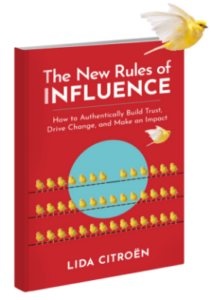Nearly everyone, from business professionals to job seekers, sales professionals to college graduates, recognizes that in today’s competitive marketplace, relationships and networks are critical assets in a professional toolkit.

I teach audiences how to use intentional networking strategies to gain introductions, leads, referrals, insights, and relationships with stakeholders they deem important to achieving their goals, objectives, and career success. The world might feel very big, but your target audience is likely a very small group.
Your network serves not only as a lead source for new business but as a sounding board, a support system, and a news source. And it requires maintenance and balance (reciprocity) to make it work.
If strategically managed and nurtured, your network can become a valuable part of your personal brand arsenal, allowing you to enhance and advance your reputation.
You Already Have a Network
Each of us has a natural network: family, friends, and people you associate with personally and professionally. Your intentional network, however, is that group of contacts you strategically and specifically recruit, maintain, and nurture and with whom you should reciprocate. Intentional networks are win-win relationships based on rapport, trust, and mutual benefit.
Who Should Be In Your Network?
Most people look to meet and network with decision-makers. These are the hiring managers, senior leaders, and people who can hire us, contract with us, and buy from us. The problem is that often, they are the most sought-after individuals and can get overwhelmed with inquiries.
I’d like to offer you two additional categories of contacts to consider having in your intentional network: information sources and cheerleaders.
Information sources may or may not have the power to hire you, promote you, and buy from you, but they might bring some unique industry information or insight that makes you more competitive, relevant, and better at your job. For this reason, when you meet someone who is potentially a valuable information source, you should network with them as if they are a decision-maker.
Similarly, a cheerleader is another vital part of any networking strategy. These are your fans. They cheer you on when things get rough and give you support and references when you need them. These positive, supportive people are very valuable in an intentional business network.
Keep in mind that each of these people will require that you provide them with equal value (reciprocity) to make the relationship work for both parties. As you network with them, keep this in mind. Consider how you might be someone else’s decision-maker, information source, or cheerleader.
To summarize:
- Decision-makers: Contacts who can provide you with direct leads, direct work, or bridge you to contacts who can. These might be hiring managers, procurement personnel, clients, customers, and agents who can transact with and buy from you.
- Information sources: Contacts who can provide valuable insight into companies, industries, trends, and people about whom you need to know. For example, someone with a deep knowledge of marketing can be helpful as you position yourself for a new job or promotion.
- Cheerleaders: Contacts who will provide references and testimonials and who will vouch for you. These contacts will give you support and encouragement. This might be a friend from your past or a colleague at your current job who is upbeat and optimistic in times of stress.
(Bear in mind that some people may be in more than one category.)
Organize and Nurture Your Network
As you begin to outline and organize your network, start listing out the people you already know. Consider alumni from high school, college, and grad school; colleagues and coworkers from current and past employment; and people you met at events, functions, and gatherings for whom you have contact information (business phone number, email). Start putting these names into a database, such as Excel or Outlook, so you can manage your relationship and refer to them.
Then, keep track of meetings, phone calls, notes sent, and other ways you have to contact with your network. Be sure no one gets left out. If you haven’t spoken to someone in awhile, send them a handwritten note saying, “hello” with an update on your work. If you meet someone new, enter him or her into your database and begin to keep them in mind when you come across an article that might be interesting to them.
Maintaining Your Network
As you build and enhance your network of contacts, consider that everyone you meet will potentially enter your network in one of many possible ways. As such, you will be engaged in a two-way dialog that must be mutually rewarding for it to work. Consider the effort, gain, and risk of each contact.
Be sure you are mindful to:
- Show reciprocity. For every favor you ask (an introduction to a job lead, a connection on LinkedIn, or referral), be sure to return with something of greater perceived value (return a lead, make a valuable introduction, or at least send a handwritten note of gratitude). The scales should always be tipped in your contact’s favor.
- Become a resource. Find ways to help your contacts. Send news clippings, books, or articles of relevance. Refer a colleague. Be seen as a person who is connected to people and information. These are low-cost ways to make a huge impact.
- Show your authenticity. When you’re genuine, people want to get to know you and help you. If you don’t know an answer to a question, say so, but then find the answer. Be that resourceful networking contact, but always show your genuine side. People connect with people.
- Stay in touch. Connect in person, online (on LinkedIn, for instance), and stay in touch. Even when you don’t have an “ask,” let your network know how you’re doing, what you’re up to, and what you might have to offer. Online, you might send an update on LinkedIn or post on Facebook letting your contacts know what’s going on in your business or your life. Typically, we only hear from people when they need something (a job, advice, a place to stay). Be the person who stays in touch to let your network know the good things happening in your life, too.
- Seek to learn. In networking, I recommend that you always look for the other person’s favorite subject. When talking with someone new, seek out things that make them smile or laugh, rather than topics that cause their face to droop. At the holidays, many of us like to talk about college-age kids returning home or holiday traditions. Asking questions that elicit a positive response indicates that you’re on the right track.
- Respect people’s feelings. While you might think that Facebook post was funny, it could hurt someone’s feelings or damage a networking relationship. Similarly, don’t share confidential or proprietary information or details unless you are 100% positive that’s okay. Reciprocity means being respectful of other people’s needs and feelings.
- Respect people’s boundaries. In networking, be mindful of the limits someone is willing to go to to help you. If you ask for a favor or an introduction (even when you intend to reciprocate) and the other person is hesitant or unwilling, learn to be okay with that. Not everyone is comfortable sharing their database and credibility with others. Reciprocity means learning when it’s okay to hear “no.”
By having a clear strategy for intentional marketing and focusing on reciprocity in building your relationships, you assume responsibility for finding and forming rewarding networking relationships. At all points in the networking process—in person and online—it’s crucial to keep your reputation and vision in check. Having this clarity will allow you to act with generosity, and you will make a positive impression for your personal brand.


